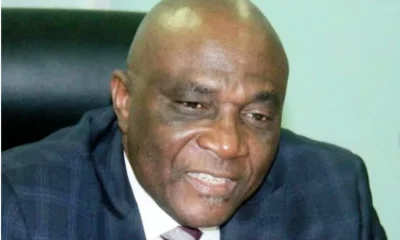Headline
Palliatives: Tinubu advised how to engage Nigerians on workable solution

Faith Nwadishi, Executive Director of Centre For Transparency Advocacy (CTA), a civil society organisation, has advised the Federal Government to urgently engage Nigerians to find workable solutions that would mitigate the hardships trailing the removal of fuel subsidy.
She made the call in Abuja on Monday at a one-day National Dialogue on Subsidy Removal, facilitated by United States Agency for International Development (USAID) and Palladium.
Nwadishi said that besides its disruption to lots of development in the country, the hasty removal of subsidy had led to untold hardships.
“It has led to people suffering and the inability of many people to meet up with the high increase in transportation, goods, services and other basic needs needed for survival.”
According to her, in the spirit of transparency, accountability and citizen participation, it has become critical for government and the political class to engage the people whom they have vowed to serve.
“This is to find out their specific problems, needs and how best they could be addressed as the voices of those directly affected by the subsidy removal must be heard and considered.”
“The decision to remove fuel subsidy has had significant implications on the lives of our fellow citizens. It has resulted in increased costs of living, affecting transportation, essential goods, and services.
“As we gather here today, it is imperative that we recognise the urgency of coming up with sustainable recommendations to mitigate the hardships faced by vulnerable groups in our society.”
One of the participants, Dr Micheal Uzoigwe, said that it was of strategic importance for government to cushion the socio-economic effects of the subsidy removal on citizens.
According to him, there is a concern that the fundamental problems that underline the failure of the subsidy regime in Nigeria may yet be ignored.
He said that fuel subsidy failed to achieve its aim in Nigeria because its administration was flawed and characterised by lack of transparency, mismanagement and corruption.
Headline
Fagbemi warns against obstructing EFCC from performing its lawful duty

The Minister of Justice, Lateef Fagbemi, SAN has warned against obstructing the Economic and Financial Crimes Commission (EFCC) from carrying out its lawful duty .
Fagbemi’s warning is contained in a statement in Abuja.
“This is a matter of very grave concern, it is now beyond doubt that the EFCC is given power by the law to invite any person of interest to interact with them in the course of their investigations into any matter, regardless of status.
“Therefore, the least that we can all do when invited, is not to put any obstruction in the way of EFCC, but to honourably answer their invitation.
“A situation where public officials who are themselves subject of protection by law enforcement agents will set up a stratagem of obstruction to the civil and commendable efforts of the EFCC to perform its duty is to say the least, insufferably disquieting’’.
He added that running away from the law will not resolve issues at stake but only exacerbate them.
“Nigeria has a vibrant judicial system that is capable of protecting everyone who follows the rule of law in seeking protection.
“I therefore encourage anyone who has been invited by the EFCC or any other agency to immediately toe the path of decency and civility by honouring such invitation instead of embarking on a temporising self-help and escapism.
“This can only put our country in bad light before the rest of the world’’.
He said institutions of state should be allowed to function effectively and efficiently.
“I stand for the rule of law and will promptly call EFCC, and indeed any other agency to order when there is an indication of any transgressions of the fundamental rights of any Nigerian by any of the agencies’’.
NAN reports that the EFCC had on Wednesday warned members of the public that it was a criminal offence to obstruct officers of the Commission from carrying out their lawful duties.
Section 38(2)(a(b) of the EFCC Establishment Act makes it an offence to prevent officers of the Commission from carrying out their lawful duties. Culprits risk a jail term of not less than five years.
The warning , the EFCC said, became necessary against the background of the increasing tendency by persons and groups under investigation by the Commission to take the laws into their hands by recruiting thugs to obstruct lawful operations of the EFCC.
On several occasions, the anti graft agency said, operatives of the Commission have had to exercise utmost restraint in the face of such provocation to avoid a breakdown of law and order.
Headline
Unknown Gunmen Abduct Channelstv Reporter In Port-harcourt

Some unknown gunmen have kidnapped Joshua Rogers, the ChannelsTV reporter in Port-Harcourt, the Rivers State capital.
Politics Nigeria learnt that Rogers was picked up close to his residence at Rumuosi in Port Harcourt and to an unknown destination by the gunmen around 9pm on Thursday, April 11.
The reporter was driving his official ChannelsTV branded car when the hoodlums accosted, pointed a gun at him and took him away in the same vehicle.
Rogers was said to be returning from his official assignment in Government House after a trip to Andoni for a government event when the incident happened.
Already, the gunmen were said to have contacted his wife and demanded a N30million ransom for bis release.
His cameraman confirmed the incident and appealed to his abductors to set him free unconditionally.






















